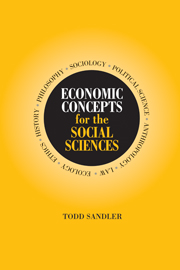Book contents
- Frontmatter
- Contents
- Table and Figures
- Preface
- 1 Economics without Apology
- 2 Back to the Future: Political Economy
- 3 In Another's Shoes: Games, Strategies, and Economics
- 4 It Takes Two or More: Public Economics and Collective Action
- 5 Government for the Politician? Public and Social Choice
- 6 Institutions Matter: The New Institutional Economics
- 7 Knowledge Is Power: Asymmetric Information
- 8 Everything Ties Together: General Equilibrium
- 9 Laboratory Economics: Of Rats and Men
- 10 Before Yesterday and Beyond Tomorrow: Intergenerational Economics
- 11 Fish, Space, and Spaceship Earth: Bioeconomics and Interdisciplinary Economics
- 12 Crystal Ball Economics: Rational Expectations
- 13 How Do We Get There from Here? Transition Economies and Policy Reforms
- 14 Economic Growth: Endogeneity, Institutions, and Other Concepts
- 15 Economic Visions of Future Horizons
- References
- Author Index
- Subject Index
9 - Laboratory Economics: Of Rats and Men
Published online by Cambridge University Press: 14 May 2010
- Frontmatter
- Contents
- Table and Figures
- Preface
- 1 Economics without Apology
- 2 Back to the Future: Political Economy
- 3 In Another's Shoes: Games, Strategies, and Economics
- 4 It Takes Two or More: Public Economics and Collective Action
- 5 Government for the Politician? Public and Social Choice
- 6 Institutions Matter: The New Institutional Economics
- 7 Knowledge Is Power: Asymmetric Information
- 8 Everything Ties Together: General Equilibrium
- 9 Laboratory Economics: Of Rats and Men
- 10 Before Yesterday and Beyond Tomorrow: Intergenerational Economics
- 11 Fish, Space, and Spaceship Earth: Bioeconomics and Interdisciplinary Economics
- 12 Crystal Ball Economics: Rational Expectations
- 13 How Do We Get There from Here? Transition Economies and Policy Reforms
- 14 Economic Growth: Endogeneity, Institutions, and Other Concepts
- 15 Economic Visions of Future Horizons
- References
- Author Index
- Subject Index
Summary
In the mid-1970s, I chanced upon a fascinating article by Kagel and associates (1975) that used male albino rats to test some basic properties of demand curves; namely, whether or not animal consumers would abide by a negative substitution effect when the price of one commodity rose relative to another. Apparently, rats enjoy drinking both root beer and Tom Collins mix, even without the alcohol. The subjects had been trained to press a left lever for root beer and a right one for Collins mix. The number of bar presses for an equal quantity of one drink versus the other drink determined the relative prices of the drinks. If, therefore, two presses on the left lever give .05 milliliters (ml) of root beer, while one press on the right one gives .05 ml of Collins mix, then the relative price of root beer in terms of Collins mix is two. The total number of bar presses available to a rat represents his income. With income and prices operationalized, a budget constraint is thus defined. By holding purchasing power constant for a price change in, say, root beer, these researchers isolated the influence of changes in the drinks' relative prices on the purchases of root beer, and, in so doing, identified the substitution effect. As anticipated, the rats displayed a textbook negative substitution effect – they “bought” more of the drink whose price fell, even when the increased purchasing power implied by the price reduction had been removed.
- Type
- Chapter
- Information
- Economic Concepts for the Social Sciences , pp. 146 - 160Publisher: Cambridge University PressPrint publication year: 2001



